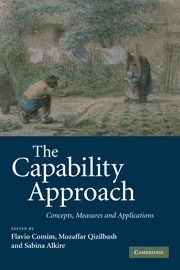Crossref Citations
This Book has been
cited by the following publications. This list is generated based on data provided by Crossref.
2008.
Bibliography on the Capability Approach 2007–2008.
Journal of Human Development,
Vol. 9,
Issue. 3,
p.
475.
Hopper, Kim
2010.
Principles of Social Psychiatry.
p.
341.
Kulkarni, Subodh P.
2010.
Sustaining the equality of employee voice: a dynamic capability.
International Journal of Organizational Analysis,
Vol. 18,
Issue. 4,
p.
442.
Farrall, Stephen
Bottoms, Anthony
and
Shapland, Joanna
2010.
Social structures and desistance from crime.
European Journal of Criminology,
Vol. 7,
Issue. 6,
p.
546.
Ahmed, Manzoor
2010.
Education as Transformation – Education for transformation.
Development,
Vol. 53,
Issue. 4,
p.
511.
Floyd, Rita
2011.
Why We Need Needs-Based Justifications of Human Rights.
Journal of International Political Theory,
Vol. 7,
Issue. 1,
p.
103.
Carter, Stacy M.
Entwistle, Vikki Ann
McCaffery, Kirsten
and
Rychetnik, Lucie
2011.
Shared Health Governance: The Potential Danger of Oppressive “Healthism”.
The American Journal of Bioethics,
Vol. 11,
Issue. 7,
p.
57.
Qizilbash, Mozaffar
2011.
Sugden’s critique of Sen’s capability approach and the dangers of libertarian paternalism.
International Review of Economics,
Vol. 58,
Issue. 1,
p.
21.
McNeill, Desmond
and
St. Clair, Asuncion Lera
2011.
Poverty, Human Rights, and Global Justice: The Response-Ability of Multilateral Organizations.
Globalizations,
Vol. 8,
Issue. 1,
p.
97.
Vahsen, Friedhelm
2011.
Theoriebildung in der Sozialen Arbeit.
p.
85.
Maddox, Bryan
and
Esposito, Lucio
2011.
Sufficiency Re-examined: A Capabilities Perspective on the Assessment of Functional Adult Literacy.
Journal of Development Studies,
Vol. 47,
Issue. 9,
p.
1315.
Edwards, José M.
and
Pellé, Sophie
2011.
Capabilities for the Miserable; Happiness for the Satisfied.
SSRN Electronic Journal,
Hodgett, Susan
and
Clark, David
2011.
Capabilities, Well-Being and Multiculturalism: A New Framework for Guiding Policy.
International Journal of Canadian Studies,
p.
163.
Binder, Martin
and
Broekel, Tom
2011.
Applying a Non‐parametric Efficiency Analysis to Measure Conversion Efficiency in Great Britain.
Journal of Human Development and Capabilities,
Vol. 12,
Issue. 2,
p.
257.
Beyazit, Eda
2011.
Evaluating Social Justice in Transport: Lessons to be Learned from the Capability Approach.
Transport Reviews,
Vol. 31,
Issue. 1,
p.
117.
EDWARDS, JOSÉ M.
and
PELLÉ, SOPHIE
2011.
CAPABILITIES FOR THE MISERABLE; HAPPINESS FOR THE SATISFIED.
Journal of the History of Economic Thought,
Vol. 33,
Issue. 3,
p.
335.
Hart, Caroline Sarojini
Sarangapani, Padma M.
and
Lowe, John
2012.
Amartya Sen’s capability approach and social justice in education, edited by M. Walker and E. Unterhalter, Basingstoke, Palgrave Macmillan, 2010, 292 pp., £19.99, ISBN 978-0-23-010459-4.
British Journal of Sociology of Education,
Vol. 33,
Issue. 4,
p.
607.
Facchinetti, Gisella
Addabbo, Tindara
Pirotti, Tommaso
and
Mastroleo, Giovanni
2012.
A fuzzy approach to face the multidimensional aspects of well-being.
p.
1.
Wright, Hazel R.
2012.
Childcare, children and capability.
Cambridge Journal of Education,
Vol. 42,
Issue. 3,
p.
409.
Ardeni, Pier Giorgio
and
Tinonin, Cecilia
2013.
Capability-Deprivation as Determinant of Underweight in Children: Perspectives from an Indian Case-Study.
SSRN Electronic Journal,





